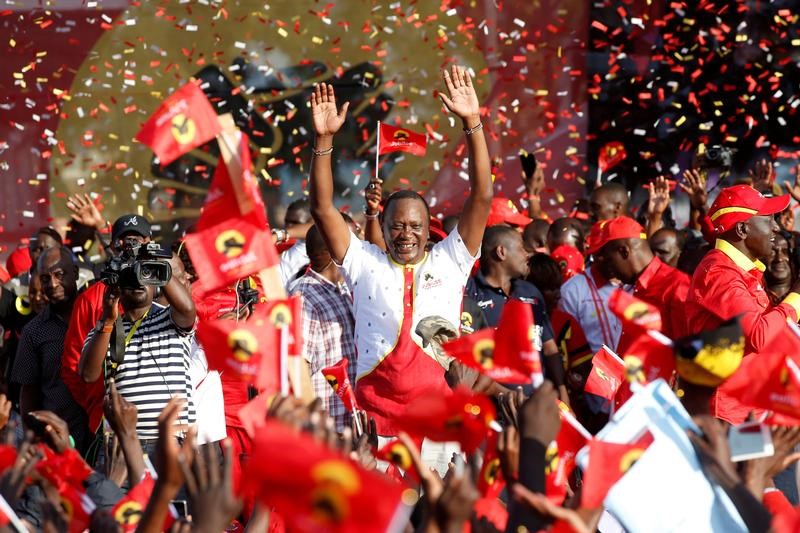By Katharine Houreld
NAIROBI (Reuters) - Jittery Kenyans queued in large numbers to vote on Tuesday in an electoral showdown between the country's foremost political dynasties, as the opposition said it was broadly satisfied with the vote so far.
Shrouded in fears of violence, the vote pits President Uhuru Kenyatta, the 55-year-old businessman son of Kenya's founding president, against Raila Odinga, a 72-year-old former political prisoner and son of Kenya's first vice-president.
The rivals are facing each other for the second time, with opinion polls putting them neck-and-neck after two months of campaigning marked by fiery rhetoric but public speeches largely free of the ethnic hate that has sullied previous contests.
A win by Odinga would upend the political dominance of the Kikuyu ethnic group, which has supplied three of Kenya's four presidents since independence from Britain in 1963.
The razor-thin polling has increased the chances of glitches - innocent or otherwise - giving grounds for the loser to complain about the result, as Odinga did in 2007 and in 2013, despite a high-tech electronic voting system.
A decade ago, vote tallying was abruptly stopped and the incumbent president declared the winner, triggering an outcry from Odinga's camp followed by outbreaks of ethnic violence in which 1,200 people were killed and 600,000 displaced.
International Criminal Court cases against Kenyatta and his now-deputy, William Ruto, for helping direct that violence collapsed for lack of evidence.
The government has deployed more than 150,000 security personnel, including wildlife rangers, to protect 41,000 polling stations. Voting mostly started smoothly, the election commission said, despite some isolated incidents and delays.
"WILL OF THE PEOPLE"
In addition to a new president, Kenyans are electing lawmakers and local representatives, the result of a post-2007 constitutional shake-up designed to devolve power and reduce the "winner takes all" nature of the presidential race that raised the stakes enough to help unleash the ethnic violence.
As he voted, Kenyatta said he would be willing to step down if he lost and called on Odinga to do the same.
"In the event that they lose, let us accept the will of the people. I am willing myself to accept the will of the people, so let them too," he said as he voted at the Mutomo Primary School in Gatundu, some 30 km (20 miles) north of the capital.
Hundreds of people had waited in line since 2 a.m., wrapped in jackets and blankets against the cold and drizzle.
The winner needs one vote more than 50 percent, and to win at least a quarter of the vote in 24 of Kenya's 47 counties.
First results are not expected before Wednesday, but a very close race means it might take three days before a winner emerges. Officially, election authorities have up to a week to declare the outcome.
"Everyone is coming out early and in big numbers because we need change so badly," said Anne-Marie Omondi, a 28-year-old Odinga supporter in Kisumu, an Odinga stronghold in western Kenya swept up in the 2007 unrest.
Odinga voted in Kibera, the country's biggest slum, but left without speaking to supporters.
Later, his key ally, Musalia Mudavadi, said the opposition alliance was largely satisfied with the vote so far.
"We commend (election officials) for the good job so far ... we also wish to commend security agencies for the professionalism displayed so far," he said in a news conference about an hour before polls were due to close at 1400 GMT.
There were still some problems with the vote, he said: delays, some agents being denied entry to polling stations, names missing from the register, and the failure of some electronic voter identification devices.
With many people still waiting, some centres remained open beyond the official end of voting.
The election head in coastal Lamu county said security fears and a lack of helicopters delayed voting by many hours in some polling stations. Elsewhere, heavy rain impeded the delivery of voting materials.
(Graphic - Kenya's presidential election - http://tmsnrt.rs/2vENDRp)
POLITICAL POWER
In 2013, electronic voting equipment suffered widespread failures, although Odinga's decision to limit his complaints to the courts quelled unrest.
This time - probably Odinga's last tilt at the top job in East Africa's biggest economy, given his age - the opposition has already repeatedly accused the government of trying to rig the polls.
The torture and murder last week of a top election official and the deportation of two foreign Odinga advisers have fuelled wild online conspiracy theories and "fake news" items consumed voraciously by Kenya's tech-savvy population.
At two polling stations in Kisumu, a few complained about their names not being in the electronic voter register system introduced this year to combat fraud.
"What am I supposed to do?" said Catherine Okello, frustrated by a hotline text message telling her to go to the nearest election commission office to sort out the problem. "Everyone from the commission is at the polling station."
Despite the fears of unrest, Kenya's shilling
An Odinga presidency would be a major victory for western Kenya, an area that has long felt neglected by the government and resentful of a perceived exclusion from political power.
Kenyatta's strongholds are in central Kenya and the Rift Valley. Urban centres are up for grabs.
Thousands of people returned to their ethnic heartlands ahead of the vote, fearful of a repeat of 2007's violence.
The electoral commission insists it has run all necessary tests to safeguard the tallying and transmission of results, although a partial test last week for the media hit some snags.

There are more than 6,000 domestic observers, and party agents at each tallying station will have to sign off on results that are then sent electronically to county offices and a national collation centre in the capital, Nairobi.